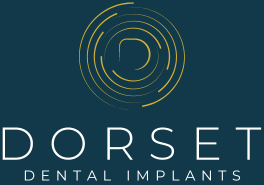Dental Implants & Periodontal Disease
Dorset Dental Implant Clinic has over 55 years of experience in restorative dentistry and providing reliable and predictable results that leave our patients feeling happy and confident.
“Saw the hygienist and had a very positive experience. Gave great advice and clearly enjoys her work.” – S.F.
Dental implants have the power to fully restore and repair your smile in as little as two appointments. Read more benefits here.
Patients considering dental implants will need to ensure that their oral health is in a good, healthy condition, prior to the placement of the dental implants.
Patients with active periodontal (gum) disease will need to be treated beforehand as it can cause complications to the future success of your dental implants.
This is because active periodontitis can create an unhealthy mouth environment that encourages the threat of infection in the gum tissue surrounding the implant. Without prior treatment, you can run the risk of implant failure.
As the mouth is required to be in a good state, it is advisable that other oral health concerns like tooth decay are addressed in order for dental implants to be a viable option.
Who is not a good candidate for dental implants?
Dental implants are a suitable treatment option for many adults with good overall general health. Check here to see if you are a suitable candidate.
Dental implants are not suitable for patients under the age of 18, this is because bones are not yet fully developed.
Patients, who are smokers are advised to reduce or ideally stop smoking prior to dental implant placement, to optimise the chance of success long term of the implant or implants.
Discover our gum disease and preventative treatments here. Or call the clinic on 01202 97 33 00 to speak to a periodontist.
Dr Philip McCauley may not recommend implants as a treatment choice for patients exhibiting:
- Diabetes that is not well managed
- Sufferers of uncontrolled and/or untreated gum disease or the more severe periodontal disease
- Heavy smoking
However, each case is different and assessed individually.
Discuss any present medical issues with your dentist, and from there, they’ll be happy to check if implants will be the best option for you. Call 01202 973300 to book an appointment today.
Signs and symptoms of gum disease:
- Red and bleeding gums (gingivitis)
- Receding gums (teeth can look long and narrow)
- Pockets or gaps forming between teeth
- Persistent bad breath or taste in your mouth
- Teeth appearing to drift or move slowly with time
Gum disease myths:
- Poor oral hygiene is not the only culprit. Poor diet and even genetics can be the reason for the development of gum disease.
- Bleeding gums are nothing to be worried about: swollen and inflamed gums that bleed when brushing, flossing or eating is not something you should ignore. Treating it as soon as you discover it is highly recommended as gum disease is connected to other diseases such as heart disease and diabetes.
- Gum disease is uncommon – gum disease is actually very common.
If I have gum disease, is it safe to have dental implants?
“90% of UK adults have gum some sort of gum disease”
Many professional and expert implantologists would agree that underlying oral health concerns, like gum disease, will need to be treated beforehand to be a viable candidate for dental implants.
Can I get dental implants if I have bone loss?
More seriously, as gum disease progresses, an untreated condition can not only lead to tooth loss but also severe bone loss.
This is because periodontal disease can damage the bone.
Once this happens, more work will need to be carried out to fully restore and rebuild your mouth’s oral condition. Patients experiencing bone loss may require a bone regeneration procedure to increase the amount of bone present in the jaw.
This will be an essential treatment for cases with bone loss so that the implants can be placed safely and securely. Read more about our bone regeneration treatment here.
Treatment and preventative strategies
It’s extremely important for us to examine your mouth to be able to identify if dental implants will be the safest and most reliable option for you. Who can have an implant?
Dorset Dental Implants are committed to implant success, which means our procedures are only carried out once the periodontitis has been successfully treated and removed from the mouth.
Our on-site hygienists are experts in gum disease treatments, who possess the specific expertise to treat your gum disease and put in place preventative measures to stop it from returning. Book an appointment.
Next steps:
- Ensuring an improved oral hygiene routine: Rigorous cleaning will be needed to restore your gums back to health. This will include regular checkups and cleaning sessions with the hygienist, brushing your teeth twice a day, flossing and preferably no smoking.
- Advanced dental treatments: Depending on the severity of the gum disease, the periodontist will thoroughly decontaminate the teeth, which is a conventional periodontal therapy method to remove any tartar and plaque deposits.
Why Choose Us
Our practice based in Poole welcomes patients throughout the south-west. Visit our implant clinic for a personal, free consultation, where our leading dentists will be able to answer all your questions and put together a custom treatment plan tailored to your oral needs. Call us today to book an appointment on 01202 973300.
